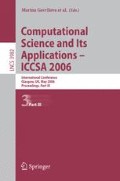Abstract
The rectilinear Steiner tree problem (RSTP) is to find a minimum-length rectilinear interconnection of a set of terminals in the plane. A key performance measure of the algorithm for the RSTP is the reduction rate that is achieved by the difference between the objective value of the RSTP and that of the minimum spanning tree without Steiner points. We introduced four evolutionary algorithm based upon fitness estimation and hybrid operator. Experimental results show that the quality of solution is improved by the hybrid operator and the calculation time is reduced by the fitness estimation. The best evolutionary algorithm is better than the previously proposed other heuristics. The solution of evolutionary algorithm is 99.4% of the optimal solution.
This research was supported by the Kyungwon University Research Fund in 2005.
Access this chapter
Tax calculation will be finalised at checkout
Purchases are for personal use only
Preview
Unable to display preview. Download preview PDF.
References
Bäck, T.: Evolutionary Algorithm in Theory and Practice. Oxford University Press, Oxford (1996)
Barreiros, J.: An Hierarchic Genetic Algorithm for Computing (near) Optimal Euclidean Stein Steiner Trees. In: Workshop on Application of hybrid Evolutionary Algorithms to NP-Complete Problems, Chicago (2003)
Beasley, J.E.: OR-Library: distributing test problems by electronic mail. Journal of the Operational Research Society 41, 1069–1072 (1990)
Beasley, J.E.: A heuristic for Euclidean and rectilinear Steiner problems. European Journal of Operational Research 58, 284–292 (1992)
Borah, M., Owens, R.M.: An Edge-Based Heuristic for Steiner Routing. IEEE Trans. on Computer Aided Design 13, 1563–1568 (1994)
France, R.L.: A note on the optimum location of new machines in existing plant layouts. J. Industrial Engineering 14, 57–59 (1963)
Ganley, J.L.: Computing optimal rectilinear Steiner trees: A survey and experimental evaluation. Discrete Applied Mathematics 90, 161–171 (1999)
Garey, M.R., Johnson, D.S.: The rectilinear Steiner tree problem is NP-complete. SIAM Journal on Applied Mathematics 32, 826–834 (1977)
Hanan, M.: On Steiner’s problem with rectilinear distance. SLAM Journal on Applied Mathematics 14, 255–265 (1966)
Hesser, J., Manner, R., Stucky, O.: Optimization of Steiner Trees using Genetic Algorithms. In: Proceedings of the Third International Conference on Genetic Algorithm, pp. 231–236 (1989)
Jin, Y.: A Survey on fitness Approximation in Evolutionary Computation. Journal of Soft Computing 9, 3–12 (2005)
Julstrom, B.A.: Encoding Rectilinear Trees as Lists of Edges. In: Proceedings of the 16th ACM Symposium on Applied Computing, pp. 356–360 (2001)
Kahng, A.B., Robins, B.: A New Class of Iterative Steiner Tree Heuristics with Good Performance. IEEE Trans. on Computer Aided Design 11, 893–902 (1992)
Lee, J.L., Bose, N.K., Hwang, F.K.: Use of Steiner’s problem in suboptimal routing in rectilinear metric. IEEE Transaction son Circuits and Systems 23, 470–476 (1976)
Sock, S.M., Ahn, B.H.: A New Tree Representation for Evolutionary Algorithms. Journal of the Korean Institute of Industrial Engineers 31, 10–19 (2005)
Soukup, J., Chow, W.F.: Set of test problems for the minimum length connection networks. ACM/SIGMAP Newsletter 15, 48–51 (1973)
Warme, D.M., Winter, P., Zachariasen, M.: Exact Algorithms for Plane Steiner Tree Problems: A Computational Study. In: Du, D.Z., Smith, J.M., Rubinstein, J.H. (eds.) Advances in Steiner Tree. Kluser Academic Publishers, Dordrecht (1998)
Warme, D.M.: http://www.group-w-inc.com/warme/research
Yang, B.H.: An Evolution Algorithm for the Rectilinear Steiner Tree Problem. In: Gervasi, O., Gavrilova, M.L., Kumar, V., Laganá, A., Lee, H.P., Mun, Y., Taniar, D., Tan, C.J.K. (eds.) ICCSA 2005. LNCS, vol. 3483, pp. 241–249. Springer, Heidelberg (2005)
Author information
Authors and Affiliations
Editor information
Editors and Affiliations
Rights and permissions
Copyright information
© 2006 Springer-Verlag Berlin Heidelberg
About this paper
Cite this paper
Yang, B. (2006). Hybrid Evolutionary Algorithms for the Rectilinear Steiner Tree Problem Using Fitness Estimation. In: Gavrilova, M., et al. Computational Science and Its Applications - ICCSA 2006. ICCSA 2006. Lecture Notes in Computer Science, vol 3982. Springer, Berlin, Heidelberg. https://doi.org/10.1007/11751595_62
Download citation
DOI: https://doi.org/10.1007/11751595_62
Publisher Name: Springer, Berlin, Heidelberg
Print ISBN: 978-3-540-34075-1
Online ISBN: 978-3-540-34076-8
eBook Packages: Computer ScienceComputer Science (R0)

